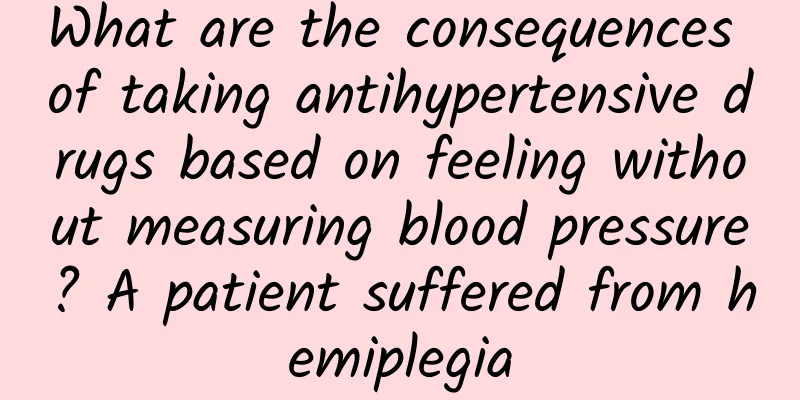What are the consequences of taking antihypertensive drugs based on feeling without measuring blood pressure? A patient suffered from hemiplegia

|
A doctor from the Department of Neurology told Huazi that a patient he treated a few days ago suffered from hemiplegia due to taking antihypertensive drugs. The patient was a 58-year-old male who had been diagnosed with hypertension for more than four years and had been taking captopril and nifedipine to control his blood pressure. However, he rarely measured his blood pressure and took antihypertensive drugs to "take the edge off" when he felt headaches and dizziness. Not long ago, he felt that the symptoms of headaches and dizziness were more severe than before, and he thought it might be "hypertension worsened", so he started to increase the dosage of the medication. A day later, not only did the headache and dizziness symptoms not ease, but he also developed black vision and numbness on the left side of his limbs. Another day later, he developed slurred speech and a loss of control over his left limbs. His family took him to the hospital and diagnosed him with cerebral infarction. The doctor analyzed that this was probably the result of his improper use of antihypertensive drugs. 1. Hypotensive Malperfusion Syndrome This patient may have suffered from "hypertensive malperfusion syndrome" due to overdose of antihypertensive drugs. It means that some patients with hypertension have narrow blood vessels, which affects blood flow. If the blood pressure is lowered too much or too quickly, it will cause insufficient blood supply to important organs such as the heart, brain, and kidneys. Especially when cerebral infarction occurs, the automatic regulation function of cerebral circulation is impaired. If the blood pressure drops by more than 25% of the original blood pressure at this time, hypotensive perfusion syndrome may occur, which will aggravate the symptoms of cerebral ischemia and cerebral edema and worsen the condition of cerebral infarction. 2. Try to choose long-acting antihypertensive drugs. The reason why this case induced antihypertensive poor perfusion syndrome is also related to the antihypertensive drugs he took. Captopril and nifedipine are both short-acting antihypertensive drugs with a short duration of efficacy, and they need to be taken 3 to 4 times a day. After each dose, the blood drug concentration will change dramatically and the blood pressure will fluctuate greatly. For patients with hypertension, it is recommended to use long-acting antihypertensive drugs taken once a day. The drug metabolism rate is slow, the blood drug concentration changes slowly, and it can produce a stable blood pressure control effect. When taken for a long time, medication compliance is better, adverse reactions are fewer, and it is safer. 3. Don’t ignore measuring blood pressure when taking medication. Many hypertensive patients take medication based on their feelings and ignore measuring blood pressure. This is a very wrong way to take medication. Hypertension cannot be cured. Antihypertensive drugs need to be taken regularly to continuously control blood pressure and prevent diseases. If you take antihypertensive drugs on an intermittent basis based on your feelings, you cannot avoid the harm of high blood pressure to your body. Moreover, symptoms of hypertension such as dizziness, headache, blurred vision, etc. may also appear when the blood pressure is too low. If the blood pressure is not measured in time and only relied on feeling, it may be mistaken for high blood pressure. At this time, using antihypertensive drugs or increasing the dosage of drugs will cause the blood pressure to further drop, resulting in antihypertensive malapparesis syndrome, which may induce diseases such as acute myocardial infarction, cerebral infarction, and renal failure. 4. Hypertensive patients should pay attention to nighttime blood pressure. Hypertensive patients should maintain a lower blood pressure value, which is more effective in preventing diseases and protecting organs. However, elderly patients should be careful, because the elderly have more severe atherosclerosis and higher stenosis, and if the blood pressure is too low, it may be dangerous. For the elderly, the goal of controlling blood pressure can be appropriately relaxed, and the speed of lowering blood pressure should be slow, and do not rush for success. Most people's blood pressure rises during the day and drops at night. After falling asleep, blood pressure drops by about 20% compared to daytime. It is recommended that patients with hypertension do 24-hour dynamic blood pressure monitoring. If their blood pressure is normal, it is recommended to take antihypertensive drugs in the early morning instead of before bedtime to avoid low blood pressure at night. In summary, people with high blood pressure should pay attention to blood pressure monitoring when using antihypertensive drugs, and give priority to long-acting antihypertensive drugs to avoid large fluctuations in blood pressure and the occurrence of antihypertensive malabsorption syndrome. The safest way is to use drugs under the guidance of a doctor, keep blood pressure records, and check regularly. I am pharmacist Huazi, welcome to follow me and share more health knowledge. |
<<: What are hops? Why are most beer bottles green?
Recommend
How much does it cost to remove the accessory breast?
Accessory breast is a common breast surgery disea...
Dilatation of the internal cervix
When a woman is close to her due date and if ther...
What is intramural uterine fibroids?
Generally speaking, uterine fibroids are divided ...
Blood pressure <115/75 in youth, younger brain in middle age! Australian study
Maintaining blood pressure below 115/75 mmHg star...
What if wheat does not sprout after one month of planting? What should I do if I cannot see any wheat seedlings?
It is abnormal that wheat has not sprouted after ...
Is vasectomy harmful to women's health?
In real life, in order to avoid unmarried pregnan...
What causes cervical erosion 2nd degree?
I believe everyone has heard about the dangers of...
What is right mastoiditis?
Mastoiditis is a subacute suppurative inflammatio...
Can HPV56 positive heal itself?
HPV stands for human papillomavirus. Many people ...
What is the situation of egg white drawing of leucorrhea
Whether leucorrhea is normal or not is always rel...
How long does it take for bleeding to stop after medication?
Medical abortion is a measure that many female fr...
What should I do if my calf muscles ache during confinement?
Many women will experience many adverse reactions...
How merchants use psychology to trick you when exchanging old items for new ones
Author: Sun Yan (Institute of Psychology, Chinese...
Can I use a vibrating massager during pregnancy?
Many pregnant women are afraid to engage in inten...
At what age do women enter menopause?
Many middle-aged women will find that their physi...









